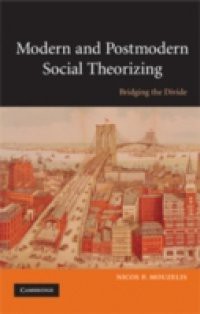There is a growing conflict between modern and postmodern social theorists. The latter reject modern approaches as economistic, essentialist and often leading to authoritarian policies. Modernists criticize postmodern approaches for their rejection of holistic conceptual frameworks which facilitate an overall picture of how social wholes (organizations, communities, nation-states, etc.) are constituted, reproduced and transformed. They believe the rejection of holistic methodologies leads to social myopia - a refusal to explore critically the type of broad problems that classical sociology deals with. This book attempts to bridge the divide between these two conflicting perspectives and proposes a novel holistic framework which is neither reductionist/economistic nor essentialist. Modern and Postmodern Social Theorizing will appeal to scholars and students of social theory and of social sciences in general.

